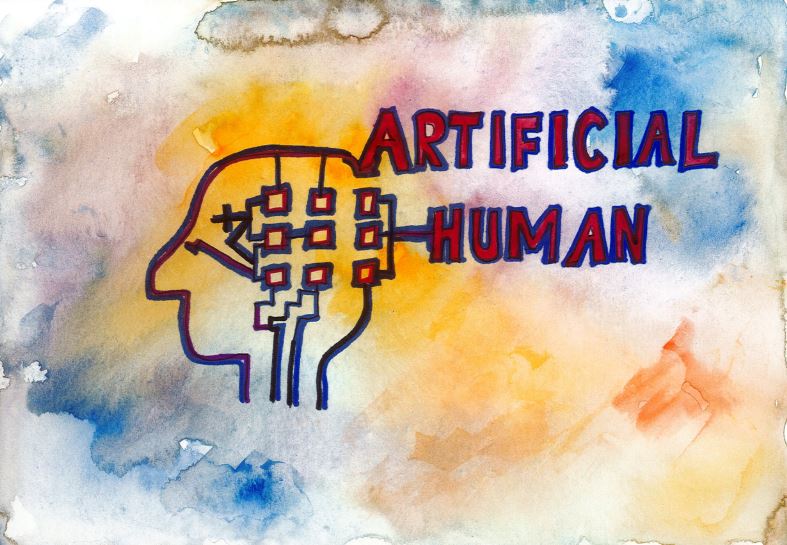There is a lot of discussion in the media and business about the development of Artificial Intelligence (AI) and the potential replacement of humans with AI (Krotoski and Fong, 2024 and see Figure 1).
Figure 1 Simple Illustration of Artificial Human

In a recent BBC radio programme, The Artificial Human, discussion focused on the potential for AI to replace actors in films (Krotoski and Fong, 2024). Perhaps the consensus of views from the discussion was summed up as follows:
“Actors should feel safe right now, but I don’t think they are safe forever.” (Aleks Krotoski)
and practical advice was provided to actors:
“Be careful what you are signing away – don’t sign all your rights away now and forever.” (Kevin Fong)
Areas of discussion that preceded these comments focused on three broad issues in the context of actors and filmmaking: empathy and emotions; ethical responsibility; and creativity.
- Empathy and Emotions
Daniel Breaker, actor and comedian, argued that the craft of acting entailed actors finding a:
“…way into the soul of a character {and that} AI cannot do that.”
He also said that empathy is a human trait and that when an audience watches an actor, a good actor will portray:
“…something you can relate to and have empathy with a character.”
His view was that AI currently lacks the emotional depth and range of performance that an actor will provide in these areas and therefore:
“Hopefully, that is our {actors’} life raft.”
2. Ethical Responsibility
Comments were given on the movie mogul Tyler Peri who had just ‘pulled funding of $800 million’ from a film project because of the potential for AI to do the job instead of human actors. AI used in the film Sora produced videos that were not perfect but were indistinguishable from human actor images on so many levels (Krotoski and Fong, 2024). This presents issues of ethical responsibility where the actors’ voices and performances may be reproduceable using machine learning technology, and considerable unemployment may ensue in the film making industry. The advice for actors was to be very careful with contracts they sign so that they do not sign away the intellectual property rights of their own voice and characters/input at the start of their careers.
3. Creativity
The potential for actors and AI to work together creatively was also discussed. However, some commentators (e.g. Amber Temple, Director of Silo) argued that AI does not combine well with actors generally, although their may be exceptions (e.g. Roger Rabbit and Avatar). However, Amber and Paul Franklin, filmmaker, and visual effects designer, said that AI currently has more impact on the visual side of filmmaking than the acting side. The latter, Amber said, still involves many ‘tiny moments of emotion’ and of ‘intonation’, ‘intention’ that AI cannot replicate. Also, she said, the creative chemistry of directors working with actors would be lost with a purely AI process (Krotoski and Fong, 2024).
So, the picture of AI and acting, at the moment, is that AI is not likely to win an Oscar. However, it is likely to continue to have a huge effect on the filmmaking industry. How much impact it will have on the acting profession itself is still hard to evaluate though because of the subtlety of the acting profession and what it involves.
Dr Peter Sharp 13th March 2024
Reference
Krotoski, A. and Fong, K. (2024) The Artificial Human – Could AI win an Oscar? BBC Radio 4, 11th March 2024, first broadcast at 16.30 {accessed on 12th March 2024 from website bbc.co.uk/programmes/m001x4vn}